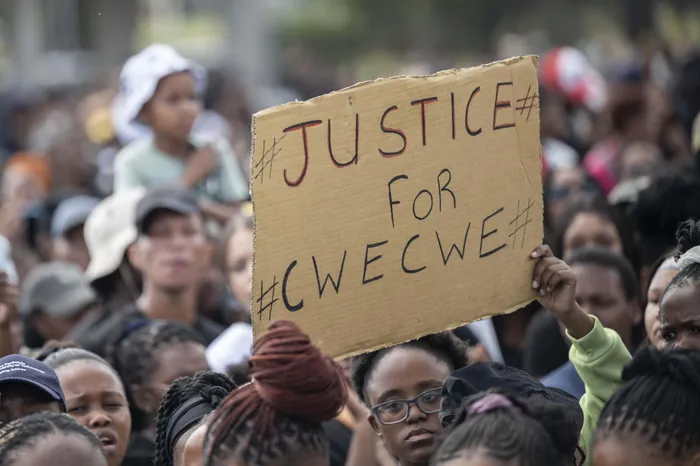Did Julius Malema violate the Children’s Act in the Cwecwe case photo op?
Rights of minors

The recent images of Julius Malema with Thandekile and Mlungiseleli Mtshinzana — Cwecwe’s parents — have drawn sharp criticism and legal scrutiny.
Image: Armand Hough / Independent Newspapers
South Africa continues to grapple with the haunting case of seven-year-old Cwecwe, whose parents allege she was raped at Bergview College.
The heartbreaking story sparked national outrage, igniting protests, widespread social media support, and renewed calls for justice in a country plagued by Gender-Based Violence. But now, amid fading public attention, another question has emerged: Did Economic Freedom Fighters (EFF) leader Julius Malema break the law when he publicly posed for photos with Cwecwe’s parents?
The Children’s Act of South Africa is explicit when it comes to the rights of minors who are victims of sexual abuse. It strictly prohibits the identification of such children, either directly or indirectly, through any form of public exposure, including media and social media.
The Act is designed to protect the dignity, safety, and privacy of child victims, shielding them from further trauma or public scrutiny. In this context, the recent images of Julius Malema with Thandekile and Mlungiseleli Mtshinzana — Cwecwe’s parents — have drawn sharp criticism and legal scrutiny.
Although the child herself was not present in the photos, many argue that associating publicly with her identifiable guardians in the context of a widely reported rape case indirectly reveals the identity of the minor. Legal experts are divided.
Some argue that the photo op constitutes a violation of the Children’s Act.“Even if the child is not named directly, if the parents are publicly identified and the context of the case is well known, then that indirectly identifies the child,” said Advocate Lindiwe Mokoena, a children’s rights attorney. “That’s precisely what the Act is designed to prevent. Public figures must tread very carefully when engaging in matters involving minors.”
Others believe the intention behind the photo should be considered.“The law is not just about enforcement, but also about context and harm,” argues constitutional law scholar Professor Themba Dlamini. “If Malema intended to advocate for justice, not to exploit or expose, then this becomes a matter of interpretation rather than a clear violation.
However, the law doesn’t require malicious intent to be broken — only that it leads to identification.”Critics of Malema accuse him of turning a deeply traumatic case into a political platform.
While he vowed that the EFF would pursue justice for Cwecwe “without rest,” others say his public appearance with the family may have unintentionally placed the child in further danger or distress. The incident has sparked a broader conversation about how South African society treats victims, especially children. After the initial outrage dies down, many victims and their families are left to fight alone.
Now, with legal and ethical questions swirling around one of the country’s most vocal political leaders, the spotlight shifts once again, not just onto justice, but onto the responsibilities of those who claim to fight for it.